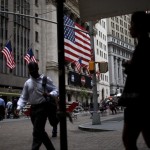2008 Financial Crisis Cost Americans $12.8 Trillion
It's been one year since the Occupy Wall Street movement and its calls for income equality, Wall Street reform and less money in politics swept the nation and forever changed the national discourse. OWS is back after a hiatus and returned to Wall Street in celebration of its one-year anniversary.
Roughly 1,000 gathered at four meeting points in downtown Manhattan early Monday, Wall Street Journal reports. The protesters were met with a heavy police presence and nearly a dozen were arrested by the New York Stock Exchange by late morning.
It is also the four-year anniversary of the collapse of Lehman Brothers -- a collapse that sparked the worst financial crisis since the stock market crash of 1929 and the worst recession since the Great Depression.
To date, there has not been a single comprehensive look at the total cost of the 2008 financial crisis. Until now.
Better Markets, a pro-financial reform Wall Street watchdog, has released what it is calling the "first-ever" report totaling the loss of American wealth since Lehman filed for bankruptcy on Sept. 15, 2008.
According to the report, entitled "Cost of the Crisis,” the financial and economic crisis cost Americans $12.8 trillion, including:
"Estimated actual gross domestic product ("GDP") loss from 2008 to 2018, of $7.6 trillion. This is the cumulative difference between potential GDP – what GDP would have been but for the financial and economic crises – and actual and forecast GDP during the period.
Estimated avoided GDP loss from 2008 to 2012 of $5.2 trillion. This figure is the estimated additional amount of GDP loss that was prevented only by extraordinary fiscal and monetary policy actions."
The report also highlights the current impact to the U.S. economy, including: 23.1 million Americans, or 15% of the public, are out of work or unable to find full-time jobs using the broadest measure of unemployment, or U-6; 9.3 million Americans have lost their health insurance; and 11 million homeowners, almost 1 in 4, are saddled with mortgages higher than the value of their homes.
